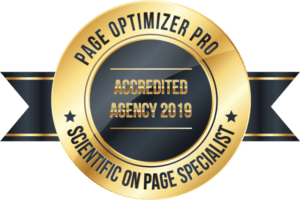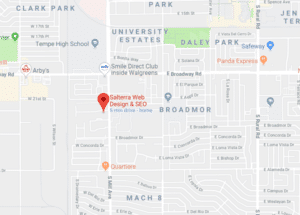
Transform Your Digital Footprint with Tailored SEO Strategies
Ensuring customers and visitors find you online quickly is the first step to a successful online presence. Salterra SEO Company will ensure you always show up for the right customers. Your customers no longer have to guess where to find you online; you never have to wonder how your business competes in your marketplace. Improving the quality and quantity of your web traffic is critical for the longevity of your business. We work closely with you to identify what sets your business apart so that we connect you with your ideal customers in a way that encourages and solidifies their buying decision.
Do you have plans to put more marketing dollars into your SEO efforts? For many businesses, this proves to be a wise decision. Search engines continue to be most websites’ primary source of web traffic, and the trend isn’t slowing down. The problem, however, is that reaching the top spot and holding onto your position has also become more challenging.
Boosting your chances of ranking for profitable keywords entails keeping up to date with the most critical factors in SEO.
1) Page Content
Content is king. There’s a reason why marketers continue to preach high-quality content despite all the changes in Google’s search algorithm. This doesn’t mean optimizing content for your target keywords; instead, your content should be written using natural language instead of forcing keywords in an attempt to rank better. This can be unclear to potential customers, misinterpreting your message and leading them to look elsewhere for your goods and services.
2) Backlinks To Your Site
Far too many marketers still depend heavily on backlinks. They say that backlinks are so powerful that they can rank less-than-stellar content. With so many automated link-building tools, Google has started devaluing links from low-quality sources.
It’s still true that the more links you have, the better the chances of your site ranking higher in the SERP. This only applies, however, if you have relevant links pointing to your site. Avoid blasting your site with thousands of links, as this is a surefire way of getting penalized.
3) Mobile-First Web Design
Google now uses mobile-first indexing. This is long overdue, considering mobile searches have surpassed desktop searches for several years. Currently, Google evaluates the mobile version of websites when determining where to place them in the search index.
Optimizing your website for mobile has become an increasingly important ranking factor. Not only will it boost your search engine rankings, but it can also have a massive impact on your conversion rates. You don’t want to risk alienating or losing site visitors by failing to offer an optimal user experience.
4) Technical Page Factors
SEO is full of technical aspects, but you don’t have to be a pro to learn how to do some basic enhancements. Switching to HTTPS, which has been shown to have a direct correlation with first-page rankings, can be highly effective in helping your business rank high. Additionally, carefully consider your H1 and H2 headings to give Google bots more clues about your content. When building links, our SEO specialists pay careful attention to your anchor text; we will avoid using exact match anchor text too much, as this has been shown to increase the risk of a Penguin penalty.
The decision to invest in SEO doesn’t have to be a financial hardship. At Salterra Web Design and SEO, we understand that many people offer extremely inexpensive search engine optimization services. As leaders in our industry, however, we also know that all too often, the cheap comes out expensive. You don’t want to invest your hard-earned marketing budget on services that will not yield favorable results. For this reason, you shouldn’t seek cheap SEO services blindly. You must follow the rules when choosing an SEO expert – even when their services come at meager prices – to ensure maximum bang for your business’s buck.
Search Engine Optimization (SEO) improves a website’s visibility and ranking on search engine results pages (SERPs) by optimizing its content, structure, and other elements to make it more appealing to search engines like Google, Bing, or Yahoo. The ultimate goal of SEO is to increase the quantity and quality of organic (non-paid) traffic to a website through higher search engine rankings.
SEO involves various techniques and strategies, which can be broadly categorized into:
- On-page SEO: Optimizing elements within a website, such as content, meta tags (title, description, keywords), header tags (H1, H2, etc.), URL structure, image optimization, and internal linking.
- Off-page SEO: Actions outside the website to improve its search engine ranking, such as link building, social media marketing, and guest blogging. Off-page SEO helps search engines understand how relevant and authoritative a website is in its niche.
- Technical SEO: Optimizing a website’s technical aspects, such as site speed, mobile-friendliness, security, structured data, and crawl ability, makes it easier for search engines to index and understand its content.
By implementing SEO strategies, a website can improve its online presence, attract more targeted visitors, and ultimately increase the chances of achieving its business goals.
Salterra SEO Company
In 2022, internet marketers and business owners will wonder whether search engine optimization (SEO) is a thing of the past. The short answer is ‘NO,’ and we will explore why.
The truth is SEO isn’t dying, but it has become somewhat more of a tactical game. A robust SEO skill set can substantially impact your business’s digital platform. The most important thing to remember is that the technology utilized by search engines is constantly being updated to give better results. Not too long ago, webmasters stuffed websites with keywords, random content, and links. At the time, this gave tremendous results in rankings. How search engines rank content, however, has drastically changed.
Today, search engines try to identify relevant individual content pieces and not just a site that happens to have matching keywords. Moving forward, search engines will be more focused on ensuring that websites and search results are more relevant to what users are looking for.
A concrete strategy for creating new and relevant content is necessary to enjoy the actual benefits of search engine optimization in this modern age. Employing this knowledge and creating a program for it ensures that it can effectively be utilized to attract visitors from social media and email channels to your website. Once a visitor is on your site, there are many ways to help them engage and convert into a regular and loyal customer and user.
Salterra SEO is located in Tempe AZ. We service clients anywhere in the world.
Local SEO Specialist
Salterra is a local SEO specialist that will help small businesses utilize the internet for maximum growth potential. Because each company has different needs, we can adapt to what is best for YOUR business model. We pride ourselves in establishing your local online footprint to effectively establish your business for the most impressive search engine presence.
As affordable SEO evolves, so must your methods for staying at the forefront of your industry where your website is concerned. To ensure a successful campaign, you must employ the appropriate techniques and ensure that your SEO resource knows how to align your company’s digital footprint with the current web trends. Success with SEO in 2022 and the coming years requires a different approach compared to the methods employed in previous years. If your SEO approach is as “human” as possible, you can be sure that good things will happen for your search engine ranking.
Social Media and SEO Techniques
As social media platforms continue to become more powerful channels for driving engagement with people, search engines are taking more influence cues from social media signals. What does this mean for your business? To ensure continuity in engagement, everything you post on social media has to link with something relevant on your site. Combining content creation and promotion with technical search engine optimization and social media is imperative to get the best traction from both strategies. This ideally means that you will have to stay on top of your SEO campaign; the plan needs to be constantly changing and evolving. Your website is not something you can just set and forget.
This approach undoubtedly increases the reach of your web content. As search engines continue to rely more on social media signals, they will be able to find a correlation between your social media content and your website. Ultimately, this will help improve your site and its key content on the search engine results pages (SERPs).

How Does SEO Work?
SEO works by helping search engines understand and evaluate the relevance and quality of a website’s content and structure, ensuring that users find the most valuable and informative results for their search queries. When you optimize a website for search engines, you’re essentially making it more accessible, user-friendly, and beneficial to both search engines and users.
Here’s a basic overview of how SEO works:
- Crawling: Search engines use automated bots, called crawlers or spiders, to discover and explore websites across the internet. These crawlers visit web pages and follow links to find new content. They collect data on the web pages they visit, such as the site’s content, images, videos, and other resources.
- Indexing: Once the crawlers have discovered and analyzed a website, they store its information in a massive search engine index database. Indexing involves organizing the collected data to make it easily retrievable when users search for relevant keywords or phrases.
- Ranking: When a user enters a query into a search engine, the search engine processes it and retrieves the most relevant results from its index. It then uses complex algorithms to determine the order in which the results should be displayed, considering factors such as keyword relevance, website authority, user experience, and more. This process is called ranking.
- Search Results: The search engine displays a list of results, or SERPs (Search Engine Results Pages), which include organic results, ads, featured snippets, and other types of content. Users can then click on the results they find most relevant and helpful.
SEO involves optimizing a website’s content, structure, and other elements to ensure that search engines can easily crawl, index, and rank the site. By doing this, you’re helping search engines better understand your website’s content and relevance, which can lead to higher rankings in SERPs, more visibility, and increased organic traffic.
What Businesses Need SEO Optimization
Search Engine Optimization (SEO) optimization is essential for almost every type of business, regardless of size, industry, or target audience. This is because SEO helps improve a website’s visibility, search engine rankings, and organic traffic, making it easier for potential customers to find and engage with your business online.
Some specific types of companies that can significantly benefit from SEO optimization include:
- Local businesses: Local businesses, such as restaurants, retail stores, and service providers, can leverage local SEO strategies to reach customers in their geographic area. These businesses can improve their visibility and attract more local customers by optimizing for local search terms and building a strong presence on local directories and review platforms.
- E-commerce businesses: Online stores rely heavily on organic search traffic to drive sales and grow their customer base. Effective SEO optimization can help e-commerce businesses improve their product page rankings, increase brand visibility, and attract more potential customers searching for their products.
- Service-based businesses: Service-based businesses, such as consultants, freelancers, and agencies, can use SEO to showcase their expertise, build their brand, and attract new clients. These businesses can increase their online visibility and credibility by creating high-quality, informative content and optimizing their website for relevant search terms.
- B2B businesses: Businesses that target other businesses (B2B) can benefit from SEO by reaching decision-makers and influencers searching for their products or services. By optimizing their website and content for industry-specific keywords and establishing a strong online presence, B2B businesses can generate more leads and close more deals.
- Niche businesses: Niche businesses with specialized products or services can use SEO to reach their target audience. These businesses can improve their visibility and establish themselves as authorities in their field by optimizing their website for niche keywords and creating valuable content tailored to their audience’s needs.
- Startups and small businesses: Startups and small businesses looking to establish their online presence and compete with larger, more established companies can significantly benefit from SEO. Optimizing their website and content from the outset can improve their chances of ranking well in search results, attracting organic traffic, and building brand recognition.
In summary, virtually every business with an online presence can benefit from SEO optimization. By investing in SEO, companies can improve their visibility in search results, attract more organic traffic, and ultimately grow their customer base and revenue.
SEO Terms and What They Mean
 On-page SEO refers to optimizing various elements on a website to improve its search engine rankings and make it more user-friendly. The goal is to ensure that search engines and users can easily understand, navigate, and engage with the content.
On-page SEO refers to optimizing various elements on a website to improve its search engine rankings and make it more user-friendly. The goal is to ensure that search engines and users can easily understand, navigate, and engage with the content.
On-page SEO optimization generally involves the following aspects:
- Keyword research: Identify relevant and high-value keywords that your target audience will likely use when searching for your website’s information, products, or services. This helps you create content that matches their intent and needs.
- Content optimization: Produce high-quality, informative, and engaging content that incorporates your target keywords naturally. Ensure that your content is well-structured, using headings (H1, H2, etc.) to break up the text and make it easier for users and search engines to understand the hierarchy and organization of the information.
- Meta tags: Optimize the title tag, meta description, and meta keywords for each page, ensuring they are relevant and concise and include your target keywords. These tags help search engines understand the context of your content and can influence click-through rates from SERPs.
- URL structure: Create clean, descriptive, and easy-to-understand URLs that include your target keywords. A well-structured URL can improve the user experience and help search engines determine the relevance of your content.
- Image optimization: Use descriptive file names, alt tags, and captions for your images, including your target keywords where appropriate. This helps search engines understand the content of your pictures and can improve your website’s accessibility.
- Internal linking: Establish a logical internal link structure that helps users navigate your website and directs search engines to essential pages. Use descriptive anchor text for your internal links, making it clear what the linked content is about.
- Mobile-friendliness: Ensure your website is responsive and mobile-friendly, as search engines prioritize websites that provide a good user experience on different devices.
- Page speed optimization: Improve your website’s loading speed by optimizing images, minifying CSS and JavaScript files, leveraging browser caching, and using a content delivery network (CDN). Faster-loading websites provide a better user experience and are favored by search engines.
- Schema markup: Implement structured data using schema markup to provide search engines with additional information about your content, which can enhance how your website is displayed in SERPs, potentially increasing click-through rates.
By focusing on these on-page SEO factors, you can create a website that is more accessible, user-friendly, and attractive to both search engines and your target audience, leading to improved search rankings and increased organic traffic.
 Off-page SEO optimization refers to the activities and strategies employed outside of your website to improve its search engine rankings, visibility, and credibility. The primary goal of off-page SEO is to establish your website as an authoritative and trustworthy source within its niche, which can lead to higher search rankings and increased organic traffic.
Off-page SEO optimization refers to the activities and strategies employed outside of your website to improve its search engine rankings, visibility, and credibility. The primary goal of off-page SEO is to establish your website as an authoritative and trustworthy source within its niche, which can lead to higher search rankings and increased organic traffic.
Off-page SEO optimization generally involves the following aspects:
- Link building: Acquiring high-quality, relevant, authoritative backlinks from other websites is crucial to off-page SEO. Backlinks are seen as “votes of confidence” by search engines, signaling that your website provides valuable content worth linking to. Some popular link-building strategies include guest blogging, broken link-building, content promotion, and outreach.
- Social media marketing: Promoting your website and content on social media platforms can help increase brand awareness, drive traffic, and potentially earn backlinks. While social media signals may not directly impact search rankings, having a solid presence can indirectly influence your website’s authority and credibility.
- Content marketing: Creating and sharing high-quality, informative, and engaging content can attract users, generate social shares, and earn backlinks. This can include blog posts, articles, videos, infographics, and other forms of content that can be shared and linked to by others.
- Influencer outreach: Collaborating with influencers in your niche can help you reach a wider audience, gain credibility, and potentially earn backlinks. This can involve guest posting on influencer blogs, partnering for joint content projects, or simply asking influencers to share your content with their followers.
- Brand mentions: Encourage and monitor mentions of your brand across the web. Unlinked brand mentions can still positively impact your website’s authority, as search engines recognize them as indicators of your brand’s relevance and popularity.
- Online reputation management: Monitor and manage your website’s online reputation by addressing negative reviews, responding to customer feedback, and actively engaging with your audience across various platforms. A solid online reputation can improve your website’s perceived trustworthiness and authority.
- Local SEO: Optimizing your website for local searches is crucial if your business has a physical presence. This includes creating and maintaining local business listings on platforms like Google My Business, Bing Places, and Yelp, obtaining positive customer reviews, and building local backlinks.
By focusing on these off-page SEO factors, you can establish your website as a trusted and authoritative source within its niche, leading to higher search engine rankings, increased organic traffic, and improved brand recognition.
 Technical SEO is the process of optimizing the technical aspects of a website to ensure that search engines can efficiently crawl, index, and rank its content. The primary goal of technical SEO is to create a solid foundation that allows search engines to access and understand your website without any difficulties, thus improving your website’s search engine performance.
Technical SEO is the process of optimizing the technical aspects of a website to ensure that search engines can efficiently crawl, index, and rank its content. The primary goal of technical SEO is to create a solid foundation that allows search engines to access and understand your website without any difficulties, thus improving your website’s search engine performance.
Technical SEO optimization generally involves the following aspects:
- Crawlability: Ensure that search engine bots can easily access, crawl, and discover your website’s content. This includes creating and maintaining an up-to-date XML sitemap, properly managing robots.txt files, and addressing any crawl errors reported by search engine webmaster tools.
- Indexability: Optimize your website to make it easier for search engines to index its content. This includes using canonical tags to prevent duplicate content issues, correctly implementing pagination, and using no index tags on pages you don’t want to be indexed.
- Site speed: Improve your website’s loading speed by optimizing images, minifying CSS and JavaScript files, leveraging browser caching, using a content delivery network (CDN), and implementing server-side optimizations. Faster-loading websites provide a better user experience and are favored by search engines.
- Mobile-friendliness: Ensure your website is responsive and mobile-friendly, as search engines prioritize websites that provide a good user experience on different devices. Use Google’s Mobile-Friendly Test tool to check and resolve any mobile usability issues.
- Site architecture: Develop a logical site structure with clear navigation and a shallow depth, making it easy for users and search engines to find and access your content. Properly use header tags (H1, H2, etc.) to establish content hierarchy and improve readability.
- Secure connection: Implement HTTPS by installing an SSL certificate on your website to ensure a secure connection between the user’s browser and your server. Search engines prioritize certain websites and display a security indicator in the browser’s address bar, which can impact user trust.
- Structured data: Use schema markup to provide search engines with additional information about your content, helping them better understand its context and potentially enhancing how your website is displayed in search results.
- Broken links and redirects: Regularly check for and fix broken links (404 errors) on your website to improve user experience and avoid negatively impacting your search rankings. Use 301 redirects to guide users and search engines to the correct pages when URLs change.
- Internationalization: If your website targets users in different languages or regions, implement hreflang tags and other localization techniques to ensure search engines understand which language or regional version of your content to display for specific users.
By focusing on these technical SEO factors, you can create a strong foundation that enables search engines to efficiently access, crawl, index, and rank your website, ultimately leading to improved search engine performance and increased organic traffic.

Understanding Semantic SEO: The Language of Search Engines
Semantic SEO revolves around context and the relationship between words, entities, and concepts. Search engines are becoming more sophisticated in understanding the meaning of web content, allowing them to deliver more accurate and relevant search results. By optimizing your website with semantic signals, you can align your content with the language of search engines and provide a more meaningful user experience.
Leveraging Entities for Enhanced Relevance
Entities play a pivotal role in Semantic SEO. Entities can be people, places, organizations, or any other concept with its own identity. By incorporating entities relevant to your industry, such as products, services, or industry-specific terms, we can establish a stronger semantic relationship between your content and search engines. This allows search engines to understand your content better and improve its visibility in relevant search results.
Optimal Keyword Research: Beyond Traditional Keyword Optimization
While traditional keyword optimization still holds significance, Semantic SEO expands the horizons of keyword research. We delve deeper into the intent behind user queries, exploring the concepts and related terms that align with your target audience’s search behavior. By identifying and incorporating these semantic keywords, we enhance your content’s relevance and capture a broader range of search queries.
 eCommerce SEO optimization refers to improving an online store’s search engine visibility, rankings, and organic traffic to drive more sales and grow the customer base. A well-optimized eCommerce website makes it easier for potential customers to find your products and navigate your store, resulting in higher conversions and revenue.
eCommerce SEO optimization refers to improving an online store’s search engine visibility, rankings, and organic traffic to drive more sales and grow the customer base. A well-optimized eCommerce website makes it easier for potential customers to find your products and navigate your store, resulting in higher conversions and revenue.
Here are some key aspects of eCommerce SEO optimization:
- Keyword research: Conduct thorough keyword research to identify relevant and high-traffic search terms that potential customers use when looking for products similar to yours. Focus on short and long-tail keywords, including product-specific and broader category terms.
- On-page optimization: Optimize your product titles, descriptions, meta tags, headers, and URL structure to include relevant target keywords. Ensure your content is unique, informative, and engaging, providing potential customers with all the necessary information to purchase.
- Site structure: Organize your eCommerce website in a clear and logical hierarchy with easily accessible categories, subcategories, and product pages. This helps users and search engines navigate your site more efficiently, improving user experience and crawlability.
- Technical SEO: Address technical aspects such as site speed, mobile-friendliness, secure connections (HTTPS), crawlability, and indexability to ensure search engines can efficiently access, crawl, index, and rank your eCommerce website.
- User experience (UX): Focus on providing a seamless and enjoyable user experience with easy navigation, clear calls to action, and a streamlined checkout process. A positive user experience can lead to higher engagement, lower bounce rates, and better search rankings.
- Rich snippets and schema markup: Implement structured data markup (such as Schema.org) to provide search engines with additional information about your products, including price, availability, and customer ratings. This can help generate rich snippets in search results, making your listings more appealing and informative to potential customers.
- Image optimization: Optimize your product images by using descriptive file names, alt tags, and proper file formats. Compress your images to reduce file size without sacrificing quality, ensuring faster page load times and a better user experience.
- Link building: Acquire high-quality, authoritative backlinks from reputable websites within your industry or niche. This can help improve your website’s credibility and authority, leading to better search rankings and increased organic traffic.
- Content marketing: Create valuable content related to your products, industry, or target audience, such as blog posts, articles, videos, or infographics. This can help attract organic backlinks, improve your website’s authority, and drive additional traffic to your online store.
- Monitoring and analysis: Regularly track your eCommerce website’s performance using analytics tools like Google Analytics and Google Search Console. Analyzing this data can help you identify areas for improvement and guide your ongoing SEO strategy.
By focusing on these eCommerce SEO optimization factors, you can improve your website’s visibility and search engine rankings, making it easier for potential customers to find and purchase your products.
 Local SEO optimization is optimizing a website to improve its visibility and rankings in search engine results pages (SERPs) for location-specific searches. The primary goal of local SEO is to help businesses with a physical presence or those that serve a specific geographic area to reach potential customers in their target location.
Local SEO optimization is optimizing a website to improve its visibility and rankings in search engine results pages (SERPs) for location-specific searches. The primary goal of local SEO is to help businesses with a physical presence or those that serve a specific geographic area to reach potential customers in their target location.
Local SEO optimization generally involves the following aspects:
- Google Business Profile (GBP): Claim, verify, and optimize your Google My Business listing, which is significant in local search results. Ensure that your business name, address, phone number (NAP), and other relevant information are accurate and up-to-date. Regularly add new photos, respond to customer reviews, and create GMB posts to keep your listing engaging and informative.
- Local citations: Create and maintain consistent, accurate business listings across local directories, online platforms, and review sites, such as Bing Places, Yelp, and TripAdvisor. Consistent NAP information across different platforms helps search engines validate your business’s legitimacy and improves local search rankings.
- Local keyword optimization: Incorporate location-specific keywords into your website’s content, meta tags, and URL structure. This includes using city or region names and localized search terms relevant to your business to help search engines understand your target location and improve your website’s visibility in local searches.
- Local link building: Acquire high-quality, local backlinks from authoritative websites, such as local news outlets, industry associations, and community organizations. Local backlinks can help increase your website’s local relevance and authority, leading to higher local search rankings.
- Local content marketing: Create content that targets your local audience, addressing their specific needs, interests, and preferences. This can include blog posts, articles, videos, and other forms of content that showcase your expertise, provide value to your local community, and engage your target audience.
- Reviews and ratings: Encourage customers to leave reviews and ratings on platforms like Google My Business, Yelp, and Facebook. Positive reviews help build your online reputation and contribute to your local search rankings. Respond to both positive and negative reviews to show that you value customer feedback and are committed to addressing their concerns.
- Schema markup: Implement structured data using schema markup for your business’s address, phone number, hours of operation, and other location-specific information. This helps search engines better understand your content and can enhance your website’s appearance in search results with rich snippets.
- Mobile-friendliness: Ensure your website is responsive and mobile-friendly, as local searches often occur on mobile devices. A mobile-optimized website can help improve user experience and search rankings, especially in local search results.
By focusing on these local SEO factors, you can improve your website’s visibility and rankings for location-specific searches, making it easier for potential customers in your target area to find and engage with your business.
 Negative SEO uses unethical or malicious techniques to sabotage a competitor’s search engine rankings. It attempts to negatively impact another website’s credibility, authority, or search engine performance, typically through black-hat SEO tactics.
Negative SEO uses unethical or malicious techniques to sabotage a competitor’s search engine rankings. It attempts to negatively impact another website’s credibility, authority, or search engine performance, typically through black-hat SEO tactics.
Negative SEO can take several forms, including:
- Link spamming: Creating many low-quality, spammy backlinks pointing to a competitor’s website. This can trigger search engine penalties, as it appears the targeted website is trying to manipulate rankings through artificial link building.
- Content scraping: Copying a competitor’s content and distributing it across various websites to create duplicate content issues. This can lead to search engines having difficulty identifying the source and potentially lowering the targeted website’s rankings.
- Unfavorable reviews: Posting fake negative reviews or encouraging others to leave negative feedback on review sites or social media platforms to tarnish a competitor’s reputation and negatively impact their search rankings.
- Hacking: Gaining unauthorized access to a competitor’s website to alter or delete content, inject malicious code, or create other security vulnerabilities. This can lead to search engine penalties, user trust issues, and long-term harm to the targeted website’s online presence.
- Removing backlinks: Contacting website owners and requesting the removal of valuable backlinks pointing to a competitor’s site under the pretense of being the website owner or an authorized representative.
- Sabotaging local SEO: Reporting false information, such as incorrect business hours, fake addresses, or fake phone numbers, to local directories and platforms like Google Business Profiles to confuse search engines and potential customers.
Negative SEO is a cruel and unethical practice against search engine guidelines. Website owners must regularly monitor their backlink profile, online reputation, and website security to identify and address potential negative SEO attacks. Implementing a proactive approach to SEO, maintaining a solid backlink profile, and following best practices can help protect your website from the harmful effects of negative SEO.
 Franchise SEO optimization is optimizing the online presence of a franchise business to improve its search engine rankings, visibility, and lead generation across multiple locations. The primary goal of franchise SEO is to help franchisees effectively reach and engage with their local target audience while supporting the franchise’s overall brand reputation and search performance.
Franchise SEO optimization is optimizing the online presence of a franchise business to improve its search engine rankings, visibility, and lead generation across multiple locations. The primary goal of franchise SEO is to help franchisees effectively reach and engage with their local target audience while supporting the franchise’s overall brand reputation and search performance.
Franchise SEO optimization generally involves the following aspects:
- Centralized brand strategy: Develop a cohesive brand strategy that ensures consistency across all franchise locations regarding messaging, branding, and design. This can help maintain a strong brand identity and improve user experience.
- Location-specific pages: Create dedicated pages on the main franchise website for each franchise location. These pages should include location-specific information, such as an address, phone number, business hours, and unique content tailored to the local audience.
- Local SEO: Optimize each franchise location page for local search, incorporating location-specific keywords, localized content, and structured data. This can improve the visibility of individual franchise locations in local search results, helping potential customers find and engage with the franchise in their area.
- Google Business Profile (GBP): Claim, verify, and optimize a separate Google My Business listing for each franchise location. Ensure that the business information, such as name, address, and phone number (NAP), is accurate and consistent across all listings. Regularly update photos, respond to reviews, and create GMB posts to keep the listings engaging and informative.
- Local citations and directories: Create and maintain accurate, consistent business listings for each franchise location across various local guides, online platforms, and review sites. Consistent NAP information helps search engines validate the legitimacy of each area and can improve local search rankings.
- Local link building: Acquire high-quality, local backlinks from authoritative websites, such as local news outlets, industry associations, and community organizations. Local backlinks can help increase each franchise location’s relevance and authority, leading to higher local search rankings.
- Reviews and ratings: Encourage customers to leave reviews and ratings on platforms like Google My Business, Yelp, and Facebook for each franchise location. Positive reviews can help build the online reputation of individual establishments and contribute to local search rankings.
- Multi-location schema markup: Implement structured data using schema markup for each franchise location, including address, phone number, hours of operation, and other location-specific information. This helps search engines better understand and display the data in search results, potentially enhancing the website’s appearance in local search results.
By focusing on these franchise SEO factors, you can improve the online presence, visibility, and search performance of individual franchise locations while supporting the franchise’s overall brand reputation and rankings.
 Franchise SEO optimization is optimizing the online presence of a franchise business to improve its search engine rankings, visibility, and lead generation across multiple locations. The primary goal of franchise SEO is to help franchisees effectively reach and engage with their local target audience while supporting the franchise’s overall brand reputation and search performance.
Franchise SEO optimization is optimizing the online presence of a franchise business to improve its search engine rankings, visibility, and lead generation across multiple locations. The primary goal of franchise SEO is to help franchisees effectively reach and engage with their local target audience while supporting the franchise’s overall brand reputation and search performance.
What are Entities?
Entities Definition:
In SEO, entities refer to specific people, places, organizations, concepts, or things with unique identities and characteristics. They can be individuals, companies, products, locations, events, or abstract concepts. Search engines use entities to understand user queries and deliver more precise and relevant search results.
Understanding Entity Types:
Entities can be categorized into different types based on their characteristics. These include people, places, organizations, events, products, concepts, etc. For example, a person entity could be a celebrity, an author, or a public figure, while a place entity could be a city, a landmark, or a business location.
The Significance of Entities in SEO
Semantic SEO and Entities:
Entities play a vital role in semantic SEO, which focuses on understanding the context and meaning of search queries. By analyzing entities, search engines can deliver more accurate search results that align with user intent. Entities help search engines connect related concepts, recognize synonyms, and infer the true meaning behind a query.
Entities and Relevance:
In SEO, entities contribute to content relevance and ensure that search engines understand the context of your web pages. By incorporating relevant entities in your content, you can enhance its visibility for specific topics and improve its chances of appearing in relevant search results.
 National SEO optimization is optimizing a website to improve its search engine rankings, visibility, and brand recognition on a national level. The primary goal of national SEO is to help businesses that target customers across an entire country rather than just a specific local area effectively reach and engage with their audience.
National SEO optimization is optimizing a website to improve its search engine rankings, visibility, and brand recognition on a national level. The primary goal of national SEO is to help businesses that target customers across an entire country rather than just a specific local area effectively reach and engage with their audience.
National SEO optimization generally involves the following aspects:
- Keyword research: Conduct comprehensive keyword research to identify relevant and high-traffic search terms your target audience uses nationally. Focus on short and long-tail keywords that reflect the products or services your business offers, as well as the needs and preferences of your target audience.
- On-page optimization: Optimize your website’s content, meta tags, headers, and URL structure to incorporate target keywords, ensuring that search engines understand the relevance of your website to those search terms. Also, focus on creating high-quality, informative, engaging content that resonates with your national audience.
- Technical SEO: Ensure that your website’s technical aspects, such as crawl ability, indexability, site speed, mobile-friendliness, and security, are optimized for search engines. This can help create a strong foundation that enables search engines to efficiently access, crawl, index, and rank your website.
- Link building: Acquire high-quality, authoritative backlinks from reputable websites relevant to your industry or niche. Backlinks are seen as “votes of confidence” by search engines, signaling that your website provides valuable content worth linking to. A strong backlink profile can help improve your website’s credibility and authority nationally.
- Content marketing: Create and promote high-quality, informative, and engaging content that appeals to your national audience. This can include blog posts, articles, videos, infographics, and other forms of content that can be shared and linked to by others, helping to increase your website’s visibility and authority.
- Social media marketing: Develop a strong presence across various platforms, promoting your content and engaging with your national audience. While social media signals may not directly impact search rankings, a robust presence can indirectly influence your website’s authority and credibility.
- Online reputation management: Monitor and manage your website’s online reputation nationally, addressing negative reviews, responding to customer feedback, and actively engaging with your audience across various platforms. A solid online reputation can improve your website’s perceived trustworthiness and authority.
- Tracking and analysis: Regularly monitor your website’s performance using analytics tools, such as Google Analytics and Google Search Console, to track traffic, rankings, and user engagement. Analyzing this data can help you identify areas for improvement and guide your national SEO strategy.
Focusing on these national SEO factors can improve your website’s visibility and search engine rankings, making it easier for potential customers nationwide to find and engage with your business.
 White Hat SEO optimization refers to the ethical and legitimate practices used to improve a website’s rankings and visibility while adhering to search engine guidelines. The primary goal of White Hat SEO is to create a sustainable and long-term strategy for increasing organic traffic and building a robust online presence. White Hat SEO practices generally focus on providing value to users and optimizing the website for search engines and human visitors.
White Hat SEO optimization refers to the ethical and legitimate practices used to improve a website’s rankings and visibility while adhering to search engine guidelines. The primary goal of White Hat SEO is to create a sustainable and long-term strategy for increasing organic traffic and building a robust online presence. White Hat SEO practices generally focus on providing value to users and optimizing the website for search engines and human visitors.
Some essential White Hat SEO techniques include:
- High-quality content: Create informative, engaging, and valuable content that addresses the needs and interests of your target audience. Focus on originality, relevance, and usefulness to provide a positive user experience and encourage organic sharing and linking.
- Keyword research and optimization: Conduct thorough keyword research to identify relevant search terms used by your target audience. Incorporate these keywords naturally into your website’s content, meta tags, headers, and URL structure, ensuring that search engines understand the relevance of your website to those search terms.
- User experience (UX): Design and structure your website in a way that provides a positive user experience, with easy navigation, clear calls to action, and a responsive design that works well on both desktop and mobile devices. A good user experience can lead to higher engagement, lower bounce rates, and better search rankings.
- Technical SEO: Optimize the technical aspects of your website, such as crawlability, indexability, site speed, mobile-friendliness, and security, to ensure that search engines can efficiently access, crawl, index, and rank your content.
- On-page optimization: Focus on optimizing individual web pages by using descriptive and keyword-rich titles, meta descriptions, headers, and alt tags, while ensuring that your content is well-structured and easily readable by both users and search engines.
- Link building: Acquire high-quality, authoritative backlinks from reputable websites within your industry or niche. Focus on building relationships and creating valuable content that others naturally want to link to, rather than engaging in manipulative link-building practices.
- Social media marketing: Establish a strong presence on relevant social media platforms to promote your content, engage with your target audience, and build brand recognition. While social media signals may not directly impact search rankings, a strong social media presence can indirectly influence your website’s authority and credibility.
White Hat SEO techniques prioritize the long-term success of your website by adhering to search engine guidelines and providing value to users. These ethical practices can help build a sustainable foundation for your online presence, resulting in improved search rankings, increased organic traffic, and a strong reputation in your industry.
 Black Hat SEO optimization refers to using aggressive, unethical, and manipulative tactics to improve a website’s rankings in violation of search engine guidelines. The primary goal of Black Hat SEO is to quickly achieve higher search rankings, often at the expense of user experience and long-term sustainability. These practices prioritize short-term gains over long-term success and can lead to penalties or removal from search engine results pages (SERPs).
Black Hat SEO optimization refers to using aggressive, unethical, and manipulative tactics to improve a website’s rankings in violation of search engine guidelines. The primary goal of Black Hat SEO is to quickly achieve higher search rankings, often at the expense of user experience and long-term sustainability. These practices prioritize short-term gains over long-term success and can lead to penalties or removal from search engine results pages (SERPs).
Some standard Black Hat SEO techniques include:
- Keyword stuffing: Overusing or repeating target keywords excessively in content, meta tags, and alt attributes to manipulate search engine rankings. This practice leads to a poor user experience and is easily detectable by search engines.
- Cloaking: Presenting different content or URLs to search engines and users to deceive search engines and improve rankings. This practice violates search engine guidelines, as it aims to trick search engines into ranking content that may not be relevant or valuable to users.
- Doorway pages: Creating low-quality, content-thin pages that serve no purpose other than to funnel users to a different page or website. Doorway pages often target specific keywords and are designed to manipulate search engine rankings but provide no value to users.
- Invisible text: Using hidden or invisible text (e.g., white text on a white background) to stuff keywords or manipulate content without being visible to users. This tactic is easily detectable by search engines and can result in penalties.
- Duplicate content: Copying content from other websites or creating multiple pages with substantially similar content to manipulate search rankings. Search engines penalize websites that engage in this practice, as it undermines the value of unique and high-quality content.
- Spammy backlinks: Building low-quality, spammy backlinks from irrelevant or malicious websites to inflate a website’s perceived authority artificially. Search engines can detect and penalize websites engaged in manipulative link-building practices.
- Private Blog Networks (PBNs): Creating a network of websites under the control of one entity solely to generate backlinks to manipulate search engine rankings. PBNs violate search engine guidelines and can result in severe penalties or removal from search results.
Black Hat SEO practices are risky and can cause significant harm to your website’s reputation, search engine rankings, and long-term success. It is always recommended to adhere to search engine guidelines and focus on White Hat SEO techniques, prioritizing user experience, valuable content, and long-term sustainability.
 Organic link building for SEO refers to naturally earning backlinks from other websites by creating high-quality, valuable, and engaging content that others want to reference or share. These backlinks are seen as “votes of confidence” by search engines, indicating that your content is valuable and relevant. Organic link building is a crucial aspect of any SEO strategy, as it can help improve your website’s authority, credibility, and search engine rankings.
Organic link building for SEO refers to naturally earning backlinks from other websites by creating high-quality, valuable, and engaging content that others want to reference or share. These backlinks are seen as “votes of confidence” by search engines, indicating that your content is valuable and relevant. Organic link building is a crucial aspect of any SEO strategy, as it can help improve your website’s authority, credibility, and search engine rankings.
Here are some effective techniques for organic link-building:
- Create high-quality content: Focus on developing unique, informative, and engaging content that addresses the needs and interests of your target audience. This can include blog posts, articles, videos, infographics, case studies, and more. High-quality content is more likely to be shared and linked to by others.
- Guest blogging: Offer to write guest posts for reputable websites or blogs within your industry or niche. This provides an opportunity to showcase your expertise and create valuable content for the host website while earning a backlink to your site.
- Be a valuable resource: Create comprehensive guides, tutorials, or how-to articles that provide in-depth information and practical solutions to common problems or questions in your industry. Such resources are often highly valued by users and can attract natural backlinks.
- Establish relationships: Build genuine relationships with influencers, industry experts, and reputable websites within your niche. Engage with them on social media, comment on their blogs, and participate in online forums or communities. These relationships can lead to natural link-building opportunities and increased visibility and credibility for your website.
- Leverage social media: Share your content across various social media platforms to reach a broader audience and increase the likelihood of others linking to your content. Engaging with your target audience on social media can also help you identify trending topics or content gaps you can address, increasing your chances of earning organic backlinks.
- Create shareable assets: Develop visually appealing and easily shareable content, such as infographics, videos, or interactive tools. These types of content tend to be more likely to be shared and linked to by others, mainly if they provide valuable information or insights.
- Monitor mentions and unlinked citations: Use tools like Google Alerts or mention tracking services to identify instances where your brand or content is mentioned but not linked. Reach out to the website owner or author and kindly request they add a link to your site.
Organic link building is a sustainable and ethical approach to improving your website’s SEO performance. Creating valuable content and fostering genuine relationships within your industry can earn high-quality backlinks that contribute to your website’s authority, credibility, and search engine rankings.
 The cost of SEO optimization can vary significantly depending on various factors, such as the size and complexity of your website, the level of competition within your industry or niche, the scope of the SEO services required, and the agency or professional you choose to work with.
The cost of SEO optimization can vary significantly depending on various factors, such as the size and complexity of your website, the level of competition within your industry or niche, the scope of the SEO services required, and the agency or professional you choose to work with.
Here’s a breakdown of some standard SEO pricing models and the associated costs:
- Monthly retainer: Many SEO agencies and professionals offer monthly retainer plans that include ongoing SEO services, such as keyword research, on-page optimization, technical SEO, link building, and reporting. Monthly retainers can range from $500 to over $5,000 per month, depending on the level of service and expertise provided.
- Project-based: Some businesses may opt for project-based SEO services, paying a one-time fee for a specific SEO project, such as a website audit, content creation, or link-building campaign. Project-based pricing can vary widely, from $1,000 to $20,000 or more, depending on the complexity and scope of the project.
- Hourly consulting: SEO consultants may charge an hourly rate for their services, providing advice, guidance, and recommendations on various aspects of SEO. Hourly rates can range from $50 to $300 per hour, depending on the consultant’s experience and expertise.
- Performance-based: In some cases, SEO providers may offer performance-based pricing, where they charge based on their results, such as improved search rankings or increased organic traffic. This pricing model can be more challenging to predict, as costs depend on the actual performance of the SEO campaign.
It’s important to note that SEO is an ongoing process, and achieving sustainable results often requires a long-term investment. When considering the cost of SEO optimization, evaluating the potential return on investment (ROI) is crucial as choosing a reputable provider that aligns with your budget and business goals. Additionally, be cautious of providers offering “too good to be true” pricing or guarantees, as quality SEO requires time, effort, and expertise.
Frequently Asked Questions About SEO
Here are ten popular questions about SEO, along with concise answers:
Q: What is SEO?
A: SEO stands for Search Engine Optimization. It’s optimizing a website to improve its visibility, rankings, and organic traffic from search engines like Google, Bing, and Yahoo.
Q: Why is SEO important?
A: SEO is important because higher visibility and rankings in search results can increase organic traffic, brand awareness, and credibility, ultimately resulting in more leads, sales, and revenue for a business.
Q: How long does it take to see results from SEO?
A: SEO is a long-term strategy, and results can take weeks or even months to materialize, depending on factors such as competition, website quality, and the process implemented. Patience and consistent effort are key to achieving sustainable SEO results.
Q: What are keywords, and how do they impact SEO?
A: Keywords are words or phrases that users enter into search engines when looking for information, products, or services. Identifying and optimizing your website for relevant keywords is crucial for improving search rankings and attracting the right audience.
Q: What is the difference between on-page, off-page, and technical SEO?
A: On-page SEO refers to optimizing content and HTML elements on your website. Off-page SEO involves building links and promoting your website externally. Technical SEO focuses on improving the technical aspects of your site, such as site speed, mobile-friendliness, and crawlability.
Q: What are backlinks, and why are they important?
A: Backlinks are links from other websites pointing to your site. They act as “votes of confidence” for your content and can improve your website’s authority, credibility, and search rankings. Building high-quality, relevant backlink is a crucial aspect of any SEO strategy.
Q: How can I measure the success of my SEO efforts?
A: You can measure the success of your SEO efforts by tracking key performance indicators (KPIs) such as organic search traffic, keyword rankings, click-through rates (CTR), and conversions. Tools like Google Analytics and Search Console can provide valuable insights into your website’s performance.
Q: What is the difference between white hat and black hat SEO?
A: White hat SEO refers to ethical, best-practice optimization techniques that adhere to search engine guidelines, focusing on providing value and a positive user experience. Black hat SEO involves deceptive, manipulative tactics that violate search engine guidelines and prioritize short-term gains over long-term sustainability.
Q: Can I do SEO, or should I hire a professional?
A: While it’s possible to learn and implement basic SEO strategies yourself, hiring a professional can save time, provide access to specialized expertise, and help achieve better results. It’s important to weigh the costs and benefits of each approach based on your specific needs and resources.
Q: How does Google’s algorithm work, and how does it impact SEO?
A: Google’s algorithm uses over 200 ranking factors to determine websites’ relevance, quality, and authority in response to a user’s search query. The algorithm is constantly updated to provide better search results and combat spam. Understanding and adapting to these updates is crucial for maintaining and improving your website’s SEO performance.
Search Engine Optimization For Your Business



 On-page SEO refers to optimizing various elements on a website to improve its search engine rankings and make it more user-friendly. The goal is to ensure that search engines and users can easily understand, navigate, and engage with the content.
On-page SEO refers to optimizing various elements on a website to improve its search engine rankings and make it more user-friendly. The goal is to ensure that search engines and users can easily understand, navigate, and engage with the content. Off-page SEO optimization refers to the activities and strategies employed outside of your website to improve its search engine rankings, visibility, and credibility. The primary goal of off-page SEO is to establish your website as an authoritative and trustworthy source within its niche, which can lead to higher search rankings and increased organic traffic.
Off-page SEO optimization refers to the activities and strategies employed outside of your website to improve its search engine rankings, visibility, and credibility. The primary goal of off-page SEO is to establish your website as an authoritative and trustworthy source within its niche, which can lead to higher search rankings and increased organic traffic.


 Local SEO optimization is optimizing a website to improve its visibility and rankings in search engine results pages (SERPs) for location-specific searches. The primary goal of local SEO is to help businesses with a physical presence or those that serve a specific geographic area to reach potential customers in their target location.
Local SEO optimization is optimizing a website to improve its visibility and rankings in search engine results pages (SERPs) for location-specific searches. The primary goal of local SEO is to help businesses with a physical presence or those that serve a specific geographic area to reach potential customers in their target location. Negative SEO uses unethical or malicious techniques to sabotage a competitor’s search engine rankings. It attempts to negatively impact another website’s credibility, authority, or search engine performance, typically through black-hat SEO tactics.
Negative SEO uses unethical or malicious techniques to sabotage a competitor’s search engine rankings. It attempts to negatively impact another website’s credibility, authority, or search engine performance, typically through black-hat SEO tactics. Franchise SEO optimization is optimizing the online presence of a franchise business to improve its search engine rankings, visibility, and lead generation across multiple locations. The primary goal of franchise SEO is to help franchisees effectively reach and engage with their local target audience while supporting the franchise’s overall brand reputation and search performance.
Franchise SEO optimization is optimizing the online presence of a franchise business to improve its search engine rankings, visibility, and lead generation across multiple locations. The primary goal of franchise SEO is to help franchisees effectively reach and engage with their local target audience while supporting the franchise’s overall brand reputation and search performance. Franchise SEO optimization is optimizing the online presence of a franchise business to improve its search engine rankings, visibility, and lead generation across multiple locations. The primary goal of franchise SEO is to help franchisees effectively reach and engage with their local target audience while supporting the franchise’s overall brand reputation and search performance.
Franchise SEO optimization is optimizing the online presence of a franchise business to improve its search engine rankings, visibility, and lead generation across multiple locations. The primary goal of franchise SEO is to help franchisees effectively reach and engage with their local target audience while supporting the franchise’s overall brand reputation and search performance.
 White Hat SEO optimization refers to the ethical and legitimate practices used to improve a website’s rankings and visibility while adhering to search engine guidelines. The primary goal of White Hat SEO is to create a sustainable and long-term strategy for increasing organic traffic and building a robust online presence. White Hat SEO practices generally focus on providing value to users and optimizing the website for search engines and human visitors.
White Hat SEO optimization refers to the ethical and legitimate practices used to improve a website’s rankings and visibility while adhering to search engine guidelines. The primary goal of White Hat SEO is to create a sustainable and long-term strategy for increasing organic traffic and building a robust online presence. White Hat SEO practices generally focus on providing value to users and optimizing the website for search engines and human visitors. Black Hat SEO optimization refers to using aggressive, unethical, and manipulative tactics to improve a website’s rankings in violation of search engine guidelines. The primary goal of Black Hat SEO is to quickly achieve higher search rankings, often at the expense of user experience and long-term sustainability. These practices prioritize short-term gains over long-term success and can lead to penalties or removal from search engine results pages (SERPs).
Black Hat SEO optimization refers to using aggressive, unethical, and manipulative tactics to improve a website’s rankings in violation of search engine guidelines. The primary goal of Black Hat SEO is to quickly achieve higher search rankings, often at the expense of user experience and long-term sustainability. These practices prioritize short-term gains over long-term success and can lead to penalties or removal from search engine results pages (SERPs). Organic link building for SEO refers to naturally earning backlinks from other websites by creating high-quality, valuable, and engaging content that others want to reference or share. These backlinks are seen as “votes of confidence” by search engines, indicating that your content is valuable and relevant. Organic link building is a crucial aspect of any SEO strategy, as it can help improve your website’s authority, credibility, and search engine rankings.
Organic link building for SEO refers to naturally earning backlinks from other websites by creating high-quality, valuable, and engaging content that others want to reference or share. These backlinks are seen as “votes of confidence” by search engines, indicating that your content is valuable and relevant. Organic link building is a crucial aspect of any SEO strategy, as it can help improve your website’s authority, credibility, and search engine rankings. The cost of SEO optimization can vary significantly depending on various factors, such as the size and complexity of your website, the level of competition within your industry or niche, the scope of the SEO services required, and the agency or professional you choose to work with.
The cost of SEO optimization can vary significantly depending on various factors, such as the size and complexity of your website, the level of competition within your industry or niche, the scope of the SEO services required, and the agency or professional you choose to work with.



